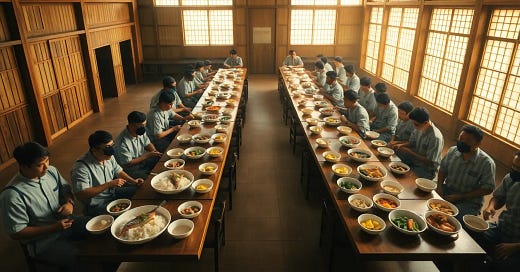
They say you can’t fix a broken soul with a ladle, but tell that to the guy who once used his fists to speak and now makes biryani that’ll make you cry for your momma.
Somewhere between peeling onions and learning how not to burn garlic, men who once burned bridges are slowly learning how to build something again — from scratch, with salt, sweat, and second chances.
Behind the clang of steel doors and the cold silence of concrete cells, there’s a quiet revolution simmering. It doesn’t shout reform. It doesn’t wear a suit. It smells like sautéed shallots, sizzles like tempura oil, and teaches more than any sermon ever could.
Traditional cooking — not gourmet, not fusion, not some bougie art-school-on-a-plate — is stepping into prison kitchens with zero pretense and one hell of a purpose: to put broken humans back together.
This isn’t some Disney-ass storyline where angry men become saints overnight after making grandma’s meatloaf. Hell no. This is gritty. Ugly. Real. The kind of rehab that makes your palms sweat, because it’s not about therapy speak or clean slates — it’s about the grind.
The discipline of boiling broth just right. The humility of scrubbing pans without whining. The trust it takes to share a kitchen knife with someone who once used one in rage.
Traditional recipes carry rules. Not the kind you ignore on TikTok for clout — but the sacred kind passed down by generations who had more wisdom than Google.
When a violent offender learns to fold dumplings the way a Javanese nenek taught her granddaughter, something inside softens. Not because of the food, but because of the respect it demands.
In a maximum-security prison in Italy, a few inmates now knead pasta dough like their lives depend on it. Because guess what — it kind of does.
The San Patrignano program didn’t start with dreams of Michelin stars; it started with heroin addicts and gang members learning to chop herbs instead of chopping egos. Now? They run a kitchen that could put your favorite trattoria to shame.
Same vibe in Indonesia — a small facility in Yogyakarta’s outskirts swapped aggression management classes for sambal grinding sessions. Result? Fewer fights, more smiles, and one dude who swears making rendang saved him from stabbing someone over a card game.
The logic is simple, yet genius. Cooking demands presence. You zone out, you burn the stew. You rush, you ruin the dish. It’s mindfulness without the yoga pants. Responsibility without the lecture. It teaches patience with a side of chili.
And don’t mistake this for some fluffy redemption arc. Some of these guys did monstrous things. Blood on their hands, pain in their trail. But what if the same hands that destroyed can now feed? Not out of guilt, but growth?
There’s a story from a prison kitchen in the UK, where a former gang enforcer broke down — not from guilt, but because he finally nailed his Jamaican grandmother’s oxtail stew.
Said it felt like she forgave him through the smell alone. You can’t write that shit. You feel it.
People love to scream “rehabilitation doesn’t work” — but maybe the issue isn’t the concept. Maybe it’s the execution. Maybe teaching someone to julienne a carrot with love is more powerful than locking them in a room to stew in hate. Maybe, just maybe, cooking is less about the food, and more about learning how not to ruin something precious.
And traditional cooking won’t solve the prison system’s mess overnight. But it plants a seed. A very stubborn, very human seed. That no matter how deep you fall, there’s still a chance to rise — one dish at a time.
So next time someone says, “they’re beyond saving,” tell them about the guy who now makes nasi uduk better than your favorite warung.
The man who once beat people for sport, now makes beef stew that hugs your ribs. Tell them healing doesn’t always come with handcuffs or handouts. Sometimes, it starts with a hand-rolled tortilla.
“You can’t teach remorse. But you can teach someone to make a meal worth remembering — and sometimes, that’s enough to begin again.”
Let the world keep spinning. Some of us are in the kitchen, trying to fix what we once broke.









